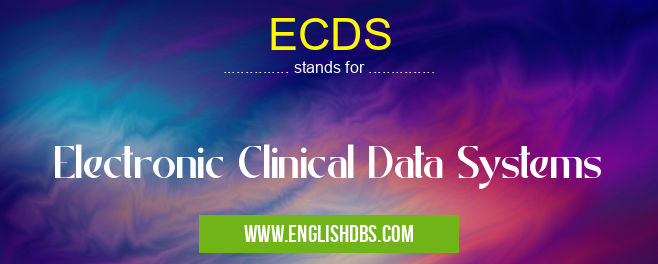What does ECDS mean in CLINICAL MEDICINE
ECDS stands for Electronic Clinical Data Systems. ECDS are designed to collect, store, and manage electronic health information, such as patient medical history, diagnoses, medications, and treatment plans. These systems are used by healthcare providers to improve the quality and efficiency of patient care.

ECDS meaning in Clinical Medicine in Medical
ECDS mostly used in an acronym Clinical Medicine in Category Medical that means Electronic Clinical Data Systems
Shorthand: ECDS,
Full Form: Electronic Clinical Data Systems
For more information of "Electronic Clinical Data Systems", see the section below.
Benefits of ECDS
- Improved patient care: ECDS can help healthcare providers track patient progress, identify potential problems, and make more informed decisions.
- Enhanced efficiency: ECDS can automate many tasks, such as scheduling appointments, sending reminders, and generating reports. This can save healthcare providers time and improve their productivity.
- Reduced costs: ECDS can help reduce costs by automating tasks and eliminating the need for paper records.
- Increased patient satisfaction: ECDS can make it easier for patients to access their health information and communicate with their healthcare providers.
Features of ECDS
- Electronic health records (EHRs): EHRs contain patient medical history, diagnoses, medications, and treatment plans.
- Clinical decision support tools: These tools can help healthcare providers make more informed decisions about patient care.
- Patient portals: Patient portals allow patients to access their health information online and communicate with their healthcare providers.
- Data analytics tools: These tools can help healthcare providers track patient outcomes and identify trends.
Implementation of ECDS
Implementing an ECDS can be a complex process. Healthcare providers should consider the following factors:
- Cost: The cost of implementing and maintaining an ECDS can vary depending on the size and complexity of the system.
- Training: Healthcare providers will need to be trained on how to use the ECDS.
- Data security: ECDSs must be protected from unauthorized access to ensure patient privacy.
Essential Questions and Answers on Electronic Clinical Data Systems in "MEDICAL»CLINICAL"
What are Electronic Clinical Data Systems (ECDS)?
ECDS are digital systems that collect, store, and manage patient health information in an organized and electronic format. They facilitate the sharing and analysis of patient data, improving healthcare efficiency and patient outcomes.
What are the benefits of using ECDS?
ECDS offer several benefits, including:
- Improved patient care through access to comprehensive and accurate health information.
- Enhanced collaboration among healthcare providers, reducing communication errors and improving patient safety.
- Increased efficiency in healthcare processes, such as scheduling appointments, issuing prescriptions, and managing medical records.
- Reduced costs through electronic documentation, streamlined billing, and improved resource allocation.
- Enhanced patient engagement and self-management, providing patients with access to their health information and empowering them in their own care.
How do ECDS ensure data security and privacy?
ECDS prioritize data security and privacy through various measures:
- Encryption and authentication mechanisms to protect data from unauthorized access.
- Compliance with regulatory standards and ethical guidelines to safeguard patient information.
- Data anonymization and pseudonymization techniques to protect patient identities.
- Regular security audits and updates to detect and mitigate vulnerabilities.
What are the challenges associated with implementing ECDS?
Implementing ECDS can present challenges, such as:
- High upfront costs and ongoing maintenance expenses.
- Integration with existing systems and workflows, requiring careful planning and coordination.
- Resistance to change from healthcare providers and patients accustomed to traditional methods.
- Data quality and standardization issues, requiring ongoing efforts to ensure data accuracy and consistency.
How can healthcare organizations overcome these challenges?
Healthcare organizations can overcome ECDS implementation challenges by:
- Conducting thorough cost-benefit analyses and securing appropriate funding.
- Involving stakeholders in the planning and implementation process to address concerns and ensure buy-in.
- Investing in training and support to help providers and patients adapt to the new system.
- Establishing data governance frameworks to ensure data quality and compliance.
- Partnering with technology vendors and consultants for expertise and support.
Final Words: ECDS are a valuable tool for healthcare providers. They can improve the quality and efficiency of patient care, reduce costs, and increase patient satisfaction. However, healthcare providers should carefully consider the factors involved in implementing an ECDS before making a decision.
